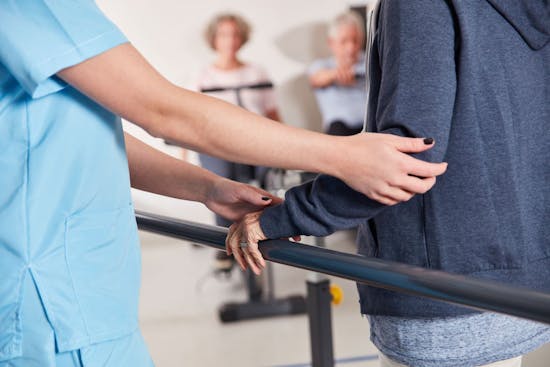Physical Therapists are experts in the art and science of the evaluation and treatment of human movement and balance dysfunctions. We care for a variety of muscle, joint, and nervous system disorders that can affect your balance.

Don’t ignore the Facts:
- One of every three persons age 65 and older falls each year.
- Falls are the leading cause of injury and accidental death in those over the age of 85.
- In 2005, 15,800 people 65 and older died from injuries related to unintentional falls.
- About 1.8 million people 65 and older were treated in ERs for injuries sustained from falls (CDC 2008).
Risk factors associated with falls:
- Older Age
- Vision Problems
- Muscle Weakness
- Medications (being on 4 or more)
- A History of Falls
- Medical Conditions (such as diabetes, arthritis, stroke, walking problems, fear of falling)
Your Physical Therapist will assess:
- Your Fall Risk
- Your Strength
- Your Balance
- Your Medical History
* Cited from Centers for Disease Control and Prevention, 2008 www.cdc.gov.
Treatment for Balance Disorders
There are more than a dozen causes of dizziness and many reasons why you might have difficulty with your balance.
Treatment of balance & dizziness disorders can be very complex. Nevertheless, we have helped numerous residents in the community cope with or recover from conditions that cause balance disorders.
The first thing your doctor will do if you have a balance problem is to determine if another health condition or a medication is to blame. If so, your doctor will treat the condition, suggest a different medication, or in many cases, refer you to one of our balance disorder experts here at Total Recovery Physical Therapy.
How Our Physical Therapists Can Help
Physical therapist directed treatment can assist patients with balance disorders in a number of ways. As experts in the evaluation and treatment of movement, muscle, joint, and nervous system disorders, our physical therapists can prescribe and implement a variety of treatments including:
- Coordination Exercises
- Proprioception Exercises
- Strengthening Exercises
- Stretching and Range of Motion Exercises
- Posture Exercises
- Retraining of the Inner Ear
- Visual Tracking Training
Education is Therapy
The most important part of treating a balance disorder is understanding your diagnosis, the cause of the problem, and how to manage it. That's why we place great emphasis on patient education and coordination of care with your referring physician.
Three Additional and Important Treatment Options
Reduce Fall Risk. Your physical therapist will assess problem footwear and hazards in your home that increase your risk of balance problems or falling. Household hazards include loose rugs, poor lighting, unrestrained pets, or other possible obstacles.
Reduce Fear of Falling. By addressing specific problems that are found during the examination, your physical therapist will help you regain confidence in your balance and your ability to move freely and perform daily activities. As you build confidence in your balance and physical ability, you will be better able to enjoy your normal daily activities.
Care Collaboration. Working in collaboration with your medical doctor, allows you to get two expert opinions and assessments of your condition. Together, we can better address your balance disorders and decrease your fear of falling and fall risks.
Positional Vertigo - A Common Cause of Dizziness & Balance Disorders
If you have BPPV (benign paroxysmal positional vertigo), our vestibular therapy experts can perform a series of simple movements, such as the Epley maneuver, which can help dislodge the otoconia (calcium crystals) from the semicircular canal of the ear. In many cases, one session works; other people need the procedure several times to relieve their dizziness.
When should I seek help if I think I have a balance disorder?
To help you decide whether to seek medical help for a dizzy spell, ask yourself the following questions. If you answer "yes" to any of these questions, talk to one of our physical therapists and your doctor:
- Do I feel unsteady?
- Do I feel as if the room is spinning around me?
- Do I feel as if I'm moving when I know I'm sitting or standing still?
- Do I lose my balance and fall?
- Do I feel as if I'm falling?
- Do I feel lightheaded or as if I might faint?
- Do I have blurred vision?
- Do I ever feel disoriented–losing my sense of time or location?
We Can Help You Cope With Your Condition
The physical therapists at Total Recovery Physical Therapy can also help increase your strength and coordination to help lower your risk of falling and getting hurt during daily activities, such as when you walk up or downstairs, use the bathroom, or exercise.
Some people with a balance disorder will need the help of our vestibular rehabilitation therapists to cope with their problems. In each case, we will conduct a personalized evaluation of your condition and then we will develop an individualized treatment plan.
Call Today
Call us today to learn more about how we can develop a personalized treatment program for your balance problems and help you get back to enjoying a higher quality of life.
Reference: ChoosePT Guide: Physical Therapist's Guide to Balance Problems
